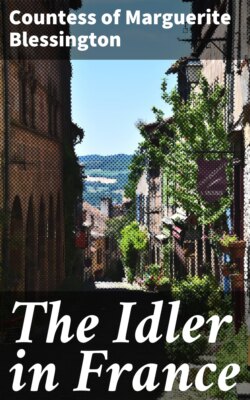Читать книгу The Idler in France - Countess of Marguerite Blessington - Страница 16
На сайте Литреса книга снята с продажи.
LYONS.
ОглавлениеI see little alteration at Lyons since I formerly passed through it. Its manufactories are, nevertheless, flourishing, though less improvement than could be expected is visible in the external aspect of the place.
This being Sunday, and the Féte-Dieu, the garrison, with flags flying, drums beating, trumpets sounding, and all in gala dress, marched through the streets to attend Divine worship. The train was headed by our old acquaintance General Le Paultre de la Motte, (whom we left at Lyons on our route to Italy), and his staff; wearing all their military decorations, attended by a vast procession, including the whole of the clergy in their rich attires and all the different religious communities in the town.
The officers were bare-headed—their spurred heels and warlike demeanour rendering this homage to a sacred ceremony more picturesque. The gold and silver brocaded vestments and snowy robes of the priests glittering in the sun, as they marched along to the sound of martial music, looked very gorgeous; and this mixture of ecclesiastical and military pomp had an imposing effect.
The streets through which the procession passed were ornamented with rich draperies and flowers, reminding me of Italy on similar occasions; and the intense heat of a sun glowing like a fiery furnace, aided the recollection.
Since I have been on the continent, it has often struck me with surprise, that on solemn occasions like the present, sacred music has not been performed instead of military. Nay, I have heard quadrilles and waltzes played, fruitful in festive associations little suited to the feelings which ought to have been excited by solemn ceremonials.
Knowing, by experience, the effect produced on the mind by sacred music, it is much to be wished that so potent an aid to devotional sentiment should not be omitted, malgré whatever may be said against any extraneous assistance in offering up those devotions which the heart should be ever prompt to fulfil without them.
I leave to casuists to argue whether, or how far, music, sculpture, or painting, may be employed as excitements to religious fervour: but I confess, although the acknowledgment may expose me to the censure of those who differ with me in opinion, that I consider them powerful adjuncts, and, consequently, not to be resigned because some—and happy, indeed, may they be deemed—stand in no need of such incitements to devotion.
Who that has heard the "Miserere" in the Sistine chapel at Rome, and seen, while listening to it, "The Last Judgment," by Michael Angelo, on its walls, without feeling the powerful influence they exercised on the feelings?
